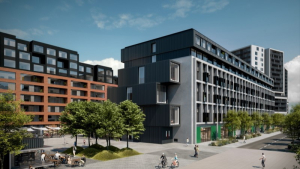
Savills has prepared an overview of how the real estate market should react to the changing age structure of the global population. This study carried out as part of Savills Impacts programme, is about the prediction of residential supply and related services and hybrid working models. The fact that many Western countries are some of the fastest ‘ageing’ in the world isn’t news. In 10 years' time, the largest proportion of the Czech Republic’s population will be between 50 and 59 years old. Other countries in CEE are in a similar position. In Germany, Austria, Italy or France, the dominant age group will be 60 to 69. Meanwhile, at the other end of the scale, many African nations are seeing increases in their youthful populations.
Residential - Smaller flats, retirement living and the positive impact of technology
Larger, older populations tend to mean more single-person households, creating demand for smaller homes – demand that is also present among younger age groups as the trend towards households getting married and having children later becomes further embedded. Technology is set to play a vital role in helping people to stay in their homes for longer and improve healthcare for elderly people. Flexible rental models and new types of housing, such as unassisted senior living, can free up real estate for younger generations while mitigating loneliness among the elderly.
Urbanisation and population – focus on ESG factors
Today, about 55 per cent of the world’s population live in towns and cities, a trend expected to increase to 68 per cent by 2050. Increased urbanisation has also compounded growing emphasis on ESG factors among investors and the general public. While occupying less than two per cent of the world’s total land area, cities produce 80 per cent of gross domestic product, but also 70 percent of carbon emissions.
The office - a place for all ages
Younger generations tend to seek a good work-life balance, with a mixture of hybrid or remote working. But they also prize the sense of community that comes from being in the workplace. In contrast, older generations often favour working at home without the distractions of the office. Any hybrid working model necessitates having a flexible office space which suits all generations when they do come together. This is especially important in ageing societies with shrinking workforces where a supportive space combined with flexible working can help keep older people in employment.
The digital generation
Generation Z – those born between 1997 and 2012 – is coming of age and has become the largest generation on Earth. With their digital savviness, these youthful global citizens are more mobile than previous generations, fuelling demand for student housing in the most popular education markets of the US, the UK and Australia.



